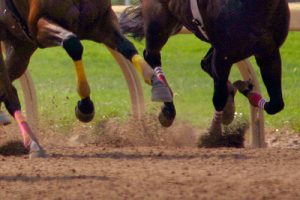 In 2018, the American horse Justify created a slice of history by becoming just the thirteenth horse to claim the Triple Crown of US racing: winning the Kentucky Derby to add to his victories in the Preakness and Belmont Stakes.
In 2018, the American horse Justify created a slice of history by becoming just the thirteenth horse to claim the Triple Crown of US racing: winning the Kentucky Derby to add to his victories in the Preakness and Belmont Stakes.
And yet, according to startling revelations from the New York Times, the horse should not have been even allowed to run in the Derby after failing a drugs test.
The paper has alleged that the Bob Baffert trained horse had tested positive for the drug scopolamine, which has been suggested to improve physical performance, after winning the Santa Anita Derby back in April.
Connections and the California Horse Racing Board, who preside over the Santa Anita track, have rubbished the claims of the NY Times, and the CHRB’s equine medical director, Rick Arthur, said: “The fact of the matter is, even a high bute case can take 60-90 days to resolve. There’s no way this case could have been resolved prior to the Kentucky Derby, which would have been the only grounds for removing the points [needed to qualify for the first leg of the Triple Crown].”
It’s not exactly the most illuminating defence, nor does Arthur even formally deny that the failed test even took place.
But there could be an innocent enough reason, with scopolamine found commonly in jimson weed, which is an additive occasionally found in horse feed.
“Jimson weed is a weed we see in California not infrequently. This is not a case of someone drugging a horse. This is a case of a horse poisoning,” Arthur confirmed.
“The board, on my and the executive director’s recommendation, made the correct, appropriate and the gutsy decision to dismiss the case.”
What is Scopolamine?

Scopolamine is found in human medicines as part of a drug to treat stomach and digestive problems, although when detected in horses it has commonly be used as a performance enhancer.
The New York Times spoke to Dr Rick Sams, who oversaw the drugs testing for the Kentucky Horse Racing Commission between 2011-18. He said that scopolamine has historically been used as a ‘bronchodilator’, which in essence means an enhancer to help keep a horse’s airways clear and enable their heart rate to remain consistent, thus preserving energy and gas in the tank.
Sams said that the dosage found in Justify’s alleged failed test, some 300 nanograms per millilitre, was ‘excessive’, and likely to have been the result of a deliberate ploy to enhance performance. “I think it has to come from intentional intervention,” he told journalists.
If any formal legal proceedings do arise from the NY Times’ report, penalties can range from fairly meagre fines – as little as $500 for the most minor drug offences – to retrospective disqualifications, purse reimbursements and suspensions.
But the upshot of the report is even more alarming for fans of US racing across the board, with the New York Times accusing the California Horse Racing Board of wilfully attempting to sweep the episode under the rug.
They claimed that the CHRB took more than a month to confirm the failed drug test results, and rather than publicising the documents as is the norm they made a series of unique decisions ‘behind closed doors’, designed to drop the case and lighten the penalties dished out to horses found with positive tests for banned substances.
The case continues, and it might just be one worth keeping an eye on.
